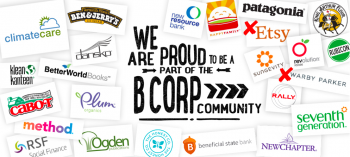By Professor Dennis R. Shaughnessy
Since we last wrote about B corporations, the tally of companies who have met the requirements for B Corp certification has soared to more than 2,600. B corps attempt to balance profit and purpose, agreeing to be transparent on five measures of performance. These measures generally align with the “stakeholder” theory of business, which continues to advance though perhaps not as rapidly as many of us would hope.
The big names in the B Corp space include Patagonia and Unilever’s Ben & Jerry’s. Two big names that are no longer are Warby Parker and Etsy. Why?
While there are of course many reasons for electing not to be a B Corp despite being a purpose-driven company, one issue stands out. By the rules created by the founder and certifying non-profit B Lab, a B Corp must convert to a statutory “public benefit corporation” after entering the public capital markets, typically via an IPO. Further, in certain states (including Delaware where most public companies are incorporated) reportedly the only way to become a certified B Corp is to be a statutory public benefit corporation. To add to the complexity, a pubic benefit corporation need not be certified as a B Corp. Statutory benefit corporations are legally required to consider the interest of all stakeholders in making corporate decisions and allocating resources, not just the interests of shareholders in maximizing profit and financial return.
 Etsy remained a B Corp after its IPO, but reportedly under significant pressure from its largest shareholders late last year management dropped the certification to avoid the statutory benefit corporation conversion requirement. After some highly publicized tension over its strategic direction, corporate culture and management’s commitment to sustained profitability, Etsy’s stock has more than doubled in 2018.
Etsy remained a B Corp after its IPO, but reportedly under significant pressure from its largest shareholders late last year management dropped the certification to avoid the statutory benefit corporation conversion requirement. After some highly publicized tension over its strategic direction, corporate culture and management’s commitment to sustained profitability, Etsy’s stock has more than doubled in 2018.
Warby Parker on the other hand remains a private company but is widely considered to be planning an IPO later this year. It raised $75 million in venture capital funds earlier this year at a valuation of $1.75 billion. Some market analysts see Amazon as a potential acquirer. Either way, Warby Parker would face the same conversion dilemma as Etsy.
The issue faced by Etsy and Warby Parker focuses us on the purpose of publicly owned companies. Can a public company commit to serve all stakeholders, not just shareholders, and still earn the support of investors? Further, can management elect to balance profits with purpose to build the best and most sustainable version of its business? The late Milton Freidman would answer both questions with a resounding “no!”, while the legal community debates the meaning and application of the nearly 100-year-old “Dodge v. Ford” case.
It appears in the case of Etsy and Warby Parker the answer is sadly “no”. If the statutory benefit corporation conversion requirement was dropped from B Corp certification their answer might be different. The answer can and should be different—purpose and profits are not only compatible but complementary.
Etsy and Warby Parker continue to do good work and with a purpose, regardless of whether they meet the technical standards for B Corp certification. In fact, Warby Parker has achieved high growth and now profitability while expanding its “one for one” program beyond its original VisionSpring program to one focused on providing eye care for students in low-income schools in New York City and Baltimore (the “Pupils Project”). Etsy continues to pursue its vision of “keeping commerce human” by supporting the work of nearly 2 million artisans selling to more than 30 million buyers. Many of Etsy’s sellers are poor or low-income women working from their homes to produce unique handmade items.
Public companies can be designed, built and managed by people who believe in balancing profit and purpose if given the freedom by investors, legislators and regulators to define their own path.


